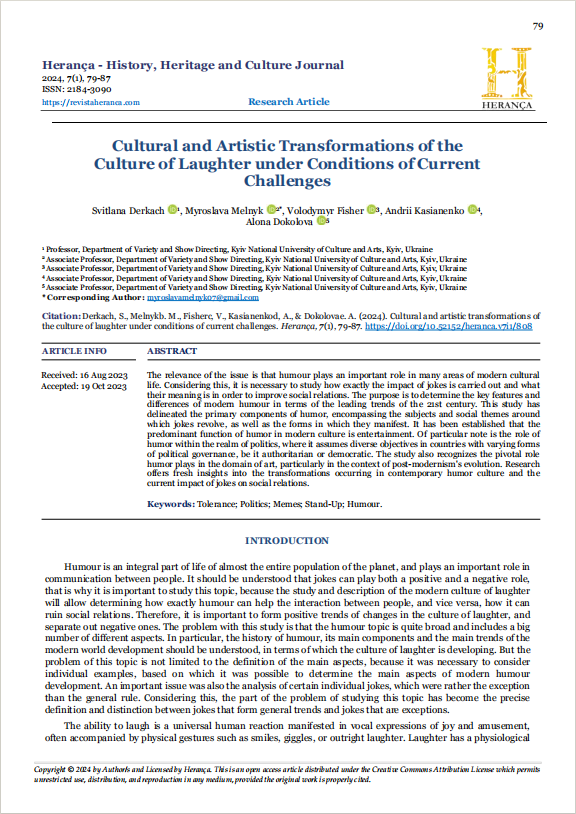Cultural and Artistic Transformations of the Culture of Laughter under Conditions of Current Challenges
DOI:
https://doi.org/10.52152/heranca.v7i1.808Palavras-chave:
Tolerance, Politics, Memes, Stand-Up, HumourResumo
The relevance of the issue is that humour plays an important role in many areas of modern cultural life. Considering this, it is necessary to study how exactly the impact of jokes is carried out and what their meaning is in order to improve social relations. The purpose is to determine the key features and differences of modern humour in terms of the leading trends of the 21st century. This study has delineated the primary components of humor, encompassing the subjects and social themes around which jokes revolve, as well as the forms in which they manifest. It has been established that the predominant function of humor in modern culture is entertainment. Of particular note is the role of humor within the realm of politics, where it assumes diverse objectives in countries with varying forms of political governance, be it authoritarian or democratic. The study also recognizes the pivotal role humor plays in the domain of art, particularly in the context of post-modernism's evolution. Research offers fresh insights into the transformations occurring in contemporary humor culture and the current impact of jokes on social relations.
Downloads
Referências
Ahmad, F. (2022). Performative retrieving of humor for socio-political subversion: stand-up comedy as a form of creative resilience. Cogent Arts and Humanities, 9(1), 381-399.
Aristotle. (2021). Politics. Chicago, MA: Independently published.
Barnes, R. (2022). "Hey! Mr Prime Minister!": The Simpsons against the Liberals, anti-fandom and the "Politics of Against". American Behavioral Scientist, 66(8), 1123-1151.
Barta, S. (2022). Influencer marketing on TikTok: The effectiveness of humor and followers' hedonic experience. Journal of Retailing and Consumer Services, 70(1), 303-314.
Becker, A. (2011). Political humor as democratic relief? The effects of exposure to comedy and straight news on trust and efficacy. Atlantic Journal of Communication, 19(5), 235-250.
Bhattacharjee, S. (2022). Dark humour and the female performance of subversion in South-Asian diasporic cinema: Chadha's rich deceiver, it's a wonderful afterlife, and what do you call an Indian woman who's funny. South Asian Studies, 38(1), 40-55.
Boyd-Barrett, O. (2023). Media and сultural agenda in the EU countries against the background of russian military aggression in Ukraine (sociological and contextual research). European Chronicle,8(1),37-45.
Cao, Y., Hou, Y., Dong, Z., & Ji, L. J. (2023). The impact of culture and social distance on humor appreciation, sharing, and production. Social Psychological and Personality Science, 14(2), 207-217.
Caroll, E. (2022). Is climate change a laughing matter. Environmental Education Research, 3(1), 617-625.
Chang, W. (2022). The role of "familiarity" in Mandarin Chinese speakers' metapragmatic evaluations of Australian conversational humour. European Journal of Humour Research, 10(2), 74-95.
Cicero. (2021). Treatises on friendship & old age. Chicago, MA: Independently published.
Davis, J. M. (2022). Humor in Asian cultures: Tradition and context. Abingdon, UK: Routledge.
Doszhan, R. (2023). Multi-vector cultural connection in the conditions of modern globalisation. Interdisciplinary Cultural and Humanities Review, 2(1), 27-32.
El-Sholfu, E. (2022). Black women comics: Sensuality and Intersectionality. Interdisciplinary Literary Studies, 24(1), 33-53.
Freud, S. (2022). A General Introduction to Psychoanalysis. London, UK: Long Road.
Gopfet, M. (2022). On dictators and clowns. Anthropology Today, 38(3), 22-24.
Harari, U. N. (2019). 21 lessons for the 21st century. London, UK: Vintage.
Hobbes, T. (2017). Leviathan. London, UK: Penguin.
How, C. (2022). What do they really "meme"? A multimodal study on "Siakap Langkawi" memes as tools for humour and marketing. 3L: Southeast Asian Journal of English Language Studies, 28(2), 160-180.
Jiang, T. (2019). Cultural differences in humor perception, usage, and implications. Frontiers in Psychology, 7(1), 45-61.
Khart, A. (2021). Emotion recognition using multimodalities. Advances in Intelligent Systems and Computing, 1375(1), 309-319.
Korobanova, O. (2017). Personal-and-role modeling of active social behavior by youth. Scientific Studios on Social and Political Psychology, 40(43), 147-156.
Kryshovska, O. (2017). Research of conditions of mutual understanding in online communication. Scientific Studios on Social and Political Psychology, 39(42), 212-221.
Lipovetsky, G. (2001). L'ère du vide. Essais sur l'individualisme contemporain. Paris, France: Gallimard..
Matamoros-Fernández, A. (2023). Taking humor seriously on TikTok. Social Media+ Society, 9(1), 20563051231157609.
Olah, A. (2022). Comedy Bootcamp: stand-up comedy as humor training for military populations. Humor, 35(4), 587-616.
Simon, S. (2019). The comedy of reflexive modernity: Reason, religion and the ambivalence of humour. Cultural Sociology, 13(2), 233-248.
Temelkuran, E. (2019). How to lose a Country: The 7 steps from democracy to dictatorship. New York, UK: Fourth Estate.
Thompson, J. E. (2020). The question of immoral humor. Penn, 7(12), 312-331.
Todoriuk, O. V. (2017). The case of politization of mass conscience as a psychological research object. Scientific Studios on Social and Political Psychology, 40(43), 128-138.
Vizcaíno-Verdú, A., & Aguaded, I. (2022). # ThisIsMeChallenge and music for empowerment of marginalized groups on TikTok. Media and Communication, 10(1), 157-172.
Wang, X. (2021). DeHumor: Visual analytics for decomposing humor. IEEE Transactions on Visualization and Computer Graphic, 28(12), 4609-4623.
Weiser, R. (2022). Meme culture and suicide sensitivity: a quantitative study. Humanities and Social Sciences Communications, 9(1), 478-491.
Yakovlev, O. V. (2020). Digital forms of fine art in the context of the development of network communications of the 21st century. Scientific Notes of KUK, 1(3), 45-71.
Yang, I., & Yeh, C. C. R. (2023). A place and time for humor: leader humor in Confucian cultures. Journal of Management & Organization, 29(1), 122-138.
Zhu, X. (2022). Exploring association between social media addiction, fear of missing out, and self-presentation online among university students: A cross-sectional study. Frontiers in Psychiatry, 13(1), 973-989.

Downloads
Publicado
Como Citar
Edição
Secção
Licença
Direitos de Autor (c) 2023 Herança - Revista de História, Património e Cultura

Este trabalho encontra-se publicado com a Licença Internacional Creative Commons Atribuição 4.0.






8.png)





